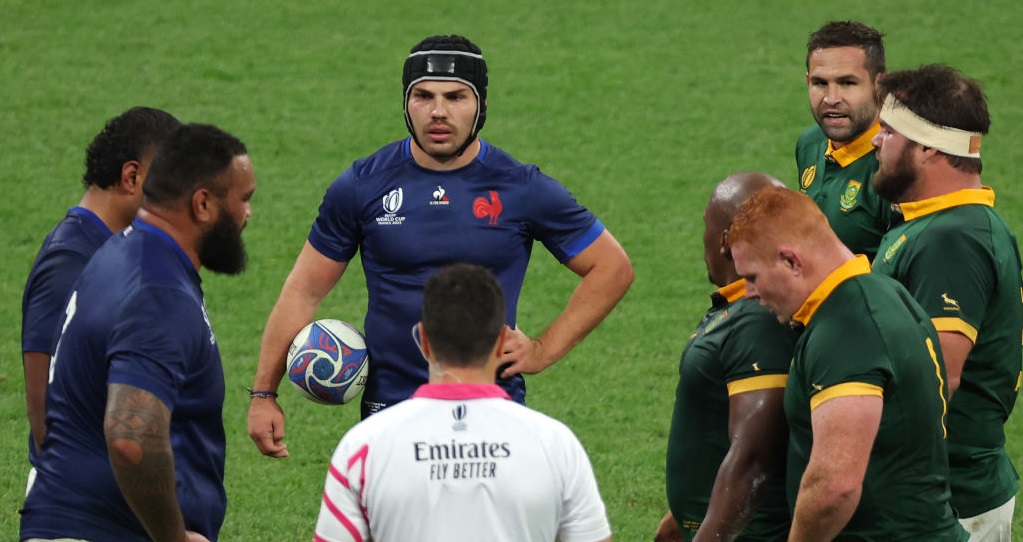World Rugby clarify 3 Law changes that will kick in from July 1st

World Rugby has clarified three law changes that will come into effect on July 1, 2024 – changes which aim to improve the game’s entertainment value while addressing safety concerns.
In a statement released this afternoon, the World Rugby Council confirmed that they have approved the amendments to enhance ball movement, expand attacking options and safeguard player welfare.
The new amendments specifically address offside rules from kicks in open play (AKA Dupont’s Law), refine the choices available from free-kicks, and ban the ‘crocodile roll’ tackle technique. These changes represent the latest phase of World Rugby’s “Shape of the Game” action plan designed to grow rugby’s audience by increasing accessibility and embracing innovation.
The offside law has been rewritten to prevent players from being put onside when the opposition catches a kicked ball and either runs five metres or passes. Offside players must now actively attempt to retreat – creating more space for the opposing team to move the ball and reducing the amount of back-and-forth ‘kick tennis’ that often slows the game.
This change will kill the loophole which saw incidents of players receiving a ball but refusing to move forwards, effectively giving them time to kick the ball downfield in a ‘king of the pitch’ style back and forth.
Maybe the most significant changes will be to laws around free-kicks.
For free-kicks, teams can no longer opt for a scrum. Instead, they are required to tap or kick the ball to keep play moving and create more attacking opportunities while reducing set-piece dead time.

The ‘crocodile roll’ – a tackle technique that involves rolling or pulling a player off their feet – has been banned to protect player safety and limit injuries. Penalizing this manoeuvre reinforces the importance of responsible tackling in rugby, World Rugby have said.
The law will help prevent some of the season-ending – and potentially career-ending – leg injuries that have resulted from the controversial practice.
In addition to these law changes, World Rugby is conducting six closed law trials across its competitions. This will include the likes of the U20 Championship and the Pacific Nations Cup.
These trials – open for national unions to opt into – include a revised red card sanction system allowing a player replacement after 20 minutes and a 30-second shot clock for scrum and lineout settings.
Further innovations include ensuring the scrum-half is not contestable at the base of a ruck or maul – increasing attacking options by allowing a mark inside the 22-metre line from a restart – and making play at lineouts more fluid by allowing it to continue if the ball isn’t thrown straight but the contest is uncontested.
The law amendments and trials are part of a comprehensive review by World Rugby to address recurring issues like slow ball movement and inconsistent use of technology. With specialist working groups exploring areas such as tackle height and fan experience – World Rugby say they aim to broaden rugby’s appeal with streamlined presentation and terminology that will attract younger audiences.
World Rugby Chairman, Sir Bill Beaumont said: World Rugby Chairman, Sir Bill Beaumont said: “I would like to thank my colleagues from across the game for embracing the spirit of this comprehensive review of rugby’s entertainment factor. With calendar certainty, including new competitions and all men’s and women’s Rugby World Cups set through to 2033, our major events are defined, our content set.
“There is unprecedented long-term certainty, and this work is vital to ensuring that the on-field product is befitting of the opportunities that we have in front of us, a superb sport that is enjoyable to play and watch and helps attract a new generation to get into rugby.
“Personally, I believe that the law amendments and suite of closed trials will add to the entertainment factor. As with all trials, we will comprehensively review their effectiveness and take feedback from across the game. The revised red card sanction process is such an example, and it is important that we trial, assess and make definitive decisions based on data and feedback.”
Unions and competitions have the option of implementing the package of law trials.
















